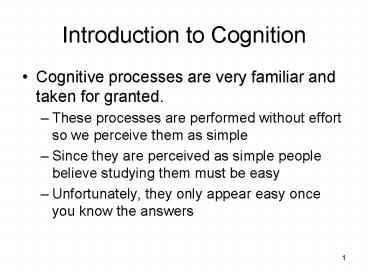Introduction to Cognition - PowerPoint PPT Presentation
Title:
Introduction to Cognition
Description:
What is the nature of the mind? ... was to study the function of the mind. Watson and others criticized the sstudy of the mind as not being scientific. ... – PowerPoint PPT presentation
Number of Views:36
Avg rating:3.0/5.0
Title: Introduction to Cognition
1
Introduction to Cognition
- Cognitive processes are very familiar and taken
for granted. - These processes are performed without effort so
we perceive them as simple - Since they are perceived as simple people believe
studying them must be easy - Unfortunately, they only appear easy once you
know the answers
2
Examples
- Two trains approaching each other, one moves at
20 mph the other 40 mph. A bird flies back and
forth between the two trains at an average of 50
mph. 4 hours later the trains meet. How far did
the bird fly? - He who hesitates is lost, but haste makes wastes
and you should look before you leap.
3
Goals of the Course
- To learn what is currently known about human
memory and cognition - To learn how these discoveries were made and how
are understanding of memory and cognition will
change as new discoveries are made - To understand how our knowledge of human
cognition can impact other fields of study and
our own way of thinking and remembering
4
What is Memory?
- Webster the power, act, or process of recalling
to mind facts previously learned or past
experiences - Problem - circular definition
- Cognitive definition the mental process of
acquiring and retaining information for later
retrieval, and the storage system in which these
processes operate.
5
What is Cognition?
- The mental processes and activities used in
perceiving, learning, remembering, thinking, and
understanding, and the act of using these
processes - Cognition involves semiautonomous mental processes
6
A Quick History of Cognition
- Questions asked by cognitive psychologists are
related to the same question ancient Greek and
Roman philosophers were asking - What is the nature of the mind?
- They attempted to answer these questions using
deductive reasoning
7
Middle Ages
- Rise of Christianity around 700AD led to the loss
of all the works of the Greeks and Romans - It was felt all knowledge could be gained through
the Bible or the works of Aristotle. Science and
philosophy were seen as unnecessary
8
16th and 17th Centuries
- The use of empirical methods observations
became important - While our sensory systems may not be perfect, we
can still use them to learn about the world
9
19th Century
- Increased interest in the brain and measuring
activity of the nervous system - 1850 von Helmholtz measures the speed of a
nerve impulse in a frogs leg - 1879 former lab assistant to von Helmholtz,
Wilhelm Wundt, sets up a lab to study mental
processes using the scietific method of physiology
10
Beginning of Psychology
- 1879 Wundt interested in how higher mental
processes produce perceptions, memory, etc. - 1890s Titchner, a student of Wundts, attempts
to describe the structure of the mind, starting
structuralism
11
Behaviorism
- American psychologists become unhappy with
structuralism - Functionalism psychology was to study the
function of the mind - Watson and others criticized the sstudy of the
mind as not being scientific. Psychology became
the study of observable behavior
12
Return to the Study of Mental Processes -
Cognition
- 1950s Psychologists began to see that
behaviorism was too rigid and didnt let them
study more interesting topics - Behaviorism unable to address relatively simple
issues or more complex abilities such as language
13
The New Cognitive Psychology
- 3 assumptions of cognitive psychology
- Mental processes exist and need to be studied if
psychology is to be useful - It is possible to infer an underlying mental
process by measuring changes in behavior that
occur when a mental process is used - Humans are active information seekers. They do
not just respond to the environment
14
An important Issue in Using Inference
- Caution that the jump from behavior to mental
process isnt too great - There may be alternative inferences that explain
the data that need to be eliminated - Another definition of inference could be educated
guess































